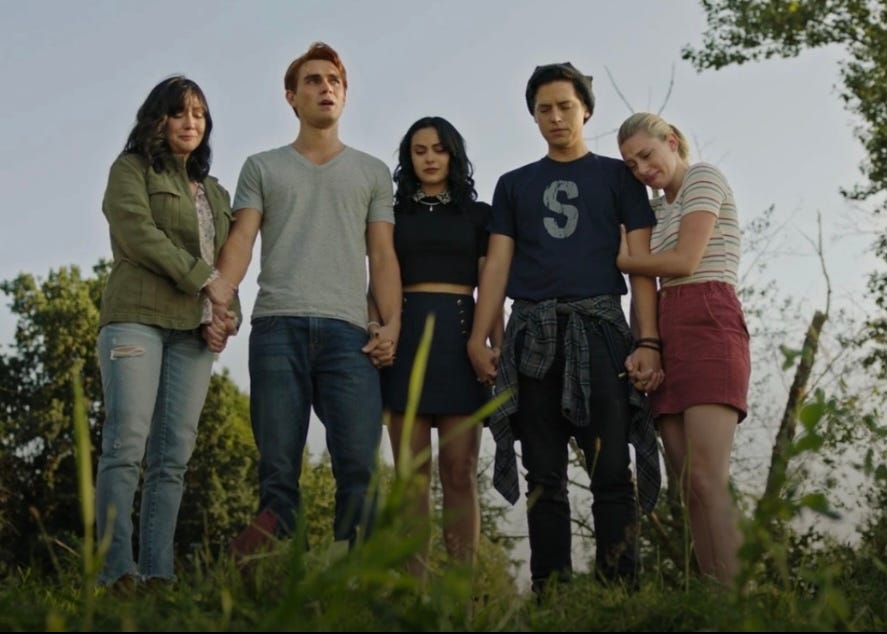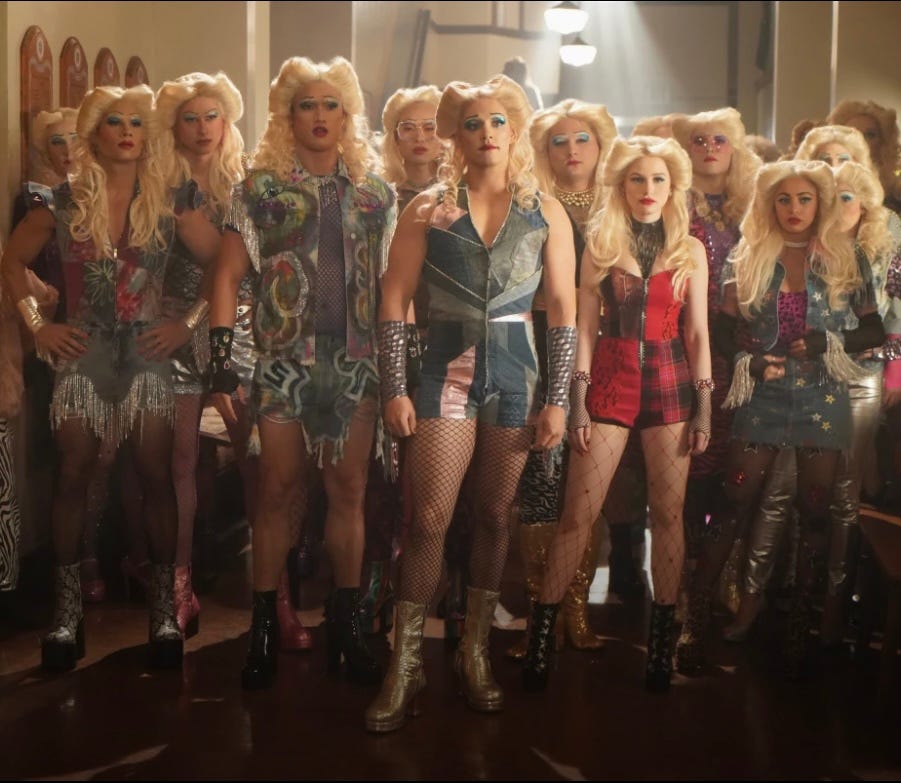”The problem with believing you have all the answers, is that is blinds you to the truth that's right before your eyes“
In my last newsletter, I discussed the many plots that make up season 4(plus the first three episodes of season 5.) This week, I’m going through a few of my favourite moments and episodes, and talking through the things that make it a fascinating and bizarre arc of the show.
The Recap Recap:
This season on Riverdale, Betty starts training with her FBI brother as she faces her dark side and continues to investigate the mysteries in the town. Jughead finds himself caught up in a conspiracy of ghost writers, plagiarism, secret societies, and murder plots when he starts attending Stonewall Prep and uncovers the truth behind the beloved Baxter Brothers and Tracy True mystery novels. Cheryl is haunted by her family’s history and the people and deeds of the past. Veronica challenges her own family legacy and starts a rum business with Cheryl’s help. Archie establishes a community centre after the death of his father. The threat of a mysterious Auteur who makes video tapes documenting the terrors of Riverdale’s past and present looms over the town. At the end of this arc, killers are unmasked, mysteries revealed, and the main cast graduate from high school and leave Riverdale to follow their chosen paths.

Favourite Episodes:
Chapter Fifty-Eight: In Memoriam
Following the death of actor Luke Perry, this series premier serves as a tribute to Perry and the character he played on Riverdale, Fred Andrews.
In the episode, Fred is killed in a hit and run accident, and Archie makes it his mission to bring his father’s body home. The town comes together to remember him, and the episode is a really touching remembrance of both the character and the actor, and the love that the cast felt for Perry really comes through in their performances. Perry was a core member of the production since season one, and in interviews many cast members have talked about his friendship, mentorship, and the impact he had. And within the show, Fred plays a similar role - he is a role model for the kids, a beacon of goodness in a town plagued by tragedy and cruelty, and he is consistently one of the best characters across the first three seasons.
In the episode, Riverdale’s core cast gather in Archie’s backyard to share their memories of Fred, and their stories are incredibly emotional and moving. Later, Archie, Jughead, Betty, and Veronica make a pilgrimage to the spot where Fred died and meet a woman played by Shannen Doherty, who worked with Perry on Beverly Hills, 90210. She is able to share a story about Fred with Archie, and the group prays together by the roadside in a beautiful moment of commemoration. This is a really special episode of Riverdale that I have always considered one of its best and most genuine stories.

Chapter Seventy-Three: The Locked Room
The truth is revealed! The episode opens with Jughead’s triumphant return as the narrator, as he explains the truth of how he faked his death, and what was going on behind the scenes during the episodes when he appeared to be dead. Then, Jughead stages what he calls ‘a locked room mystery’1 - revealing to his former literature class that he is, in fact, alive, and explaining the full truth behind the mystery. As Jughead and Betty tell the group, the truth behind the story is all about “cycles of violence.” This episode is fast moving and exciting, and it’s really satisfying to see all of the puzzle pieces and flashbacks that we’ve seen parts of throughout the season sequenced back together, and to learn the true context behind the many ominous and mysterious occurrences that have led up to the reveal. While Francis DuPont and the Stonewall students are smug and confident, Betty and Jughead are able to prove the whole truth behind Jughead’s murder, the mysteries of Stonewall Prep, and the full story of the Baxter Brothers mystery empire. I love the classic murder mystery parlour reveal feeling of this episode, and the complex, intricate reveal of the solution cements this as one of Riverdale’s best mystery storylines. My love of the episode is dampened by the scene where FP and Jughead do police brutality to Bret to get him to confess, which is supposed to seem justified because Bret sucks so much, but is actually just horrific and unethical. For the most part though, this is a really good episode, and an example of Riverdale at its best, its cycles of generational trauma, vengeance, parents and children, legacies and secrets, authorship and theft and homage, all continuing on and on.
Chapter Seventy-Four: Wicked Little Town
I absolutely love this episode. It’s absurd, over the top, and incredibly entertaining! Following the reveal of the truth behind the Baxter Brothers and Jughead’s death, and in the midst of the video tapes/Voyeur/Auteur mystery, this episode is a light in the darkness, focusing on teen drama and the lead up to Riverdale High School’s variety show, where Kevin plans to perform a number from the musical Hedwig and the Angry Inch. When strict, conservative school principal Honey tells him he can’t, the students rebel. I also really like the arc we see from Archie in this episode, as it shows him finally getting back into music when he tries to start his band(The Archies!) to perform in the showcase, which feels like a big step for him after he has struggled with the loss of his father all of this season, and it is clear that his moving away from music was tied to the lingering trauma from his relationship with his music teacher. The performances and shared love of music brings the characters and storylines together in a way we don’t often get to see on the show.

This is an episode where it really feels like the cast is having fun, which I think always comes through in the experience of watching it, and I feel like the quality of the musical performances has improved a lot over the previous musical episodes. The opening, “Wicked Little Town” proves to be a fitting anthem for Riverdale and its inhabitants, “Wig in a Box” is a group number that shows the lighthearted and fun side of the friendships between Betty, Kevin, Cheryl, Toni, and Veronica(moments where we get to see genuine friendship like this often feel limited), and “The Origin of Love” explores new relationships among the group(finally shaking up the ship status quo in the core four! Drama!). While some of the numbers are less successful, and the show struggles sometimes to fit its characters into the narratives of the songs(which all have a lot of specific lyrics about East Berlin that do not fit into Riverdale) - for example “Sugar Daddy” performed by Toni, Cheryl, and a group of the River Vixens in Pop’s Diner is somewhat inappropriate and unnecessary, as Principal Honey rightfully points out before being accused of being “queerphobic” by Cheryl; while the fights between Veronica, Archie, Betty, and Jughead that lead up to “Exquisite Corpse” are conflicts manufactured exclusively to give them an excuse to perform the song. With all of that being said, the episode is fast moving and full of funny moments, and fun music, and I especially love the final performance of “Midnight Radio” in La Bonne Nuit, which incorporates the entire main cast and is a loving testament to the characters and relationships that make Riverdale sing.
Chapter Seventy-Six: Killing Mr. Honey
I have to preface by saying that when this episode first aired, I absolutely hated it. Moved into the finale slot for season 4 by production issues, I found it incredibly unsatisfying as a season finale when I had been expecting the conclusion of the Auteur mystery, and this episode instead tells a mostly self-contained story with surprising, but anticlimactic results. However, when revisiting it, I was struck by how clever and interesting I found the episode.
“Killing Mr. Honey” is an episode that I initially wrote off as filler, similar to my reaction to an earlier episode, “To Die For”, which I found lacking initially, but now appreciate for the way that it seeks to speak directly to audience and fans, and replicated viewer debates over Jughead’s death, conspiracy theories about Stonewall, and even specific fandom memes and shipping drama, through interviews with the characters that Alice Smith does while reporting on Jughead’s murder. This episode, too, focuses less on developing the plot and mystery of the show, and more on exploring the metatextual levels of the narrative and the themes of this season relating to authorship and viewership.
The episode follows Jughead as he works on a short story that he plans to submit to a creative writing programme. After a series of strict and unfair decisions by Principal Honey’s administration at Riverdale High(he refuses to publish the yearbook, he bans most of the senior class from prom, leaving only Jughead and Archie to attend prom together (Kevin: “let the fanfiction begin”) and he shuts down Kevin’s plans for the variety show) the students have developed a shared hatred of their principal. Jughead’s short story imagines what might happen if he and his friends were to take revenge. The episode cuts between the real world in Riverdale, and the narrative unfolding in Jughead’s draft, and throughout the episode the sense of the ‘real’ and the ‘fictional’ is brought into doubt. Jughead is the writer of the story within the episode, but he is also the narrator of the show, which positions him not just as a writer, but as the storyteller of Riverdale itself. Our understanding of the events he is recounting is always mediated through the lens of Jughead’s stories, his feelings about the people and places around him, and his love of noir mysteries, mob movies, and genre fiction always bleeding through into the world he is creating. He loves to reference and pay homage to his favourite films and writers, and the stories he writes in the show are almost always based upon his own experiences and the characters closely mirror his friends and foes. Throughout the show, then, how can we ever say that anything that happens in Riverdale is either true or fictional within the show, either accurate or reimagined? Just as much as the novels and short stories he composes, Riverdale is one of Jughead’s narratives.
In the short story “Killing Mr. Honey” being written within the episode “Killing Mr. Honey,” a group of Jughead’s friends and fellow classmates, including Archie, Betty, Veronica, Cheryl, and Reggie, kidnaps Principal Honey and holds him hostage at a cabin in Fox Forest in retribution for the perceived injustices enacted at Riverdale High. However, things go wrong when one of the group accidentally(?) murders Mr. Honey, and they all must work together to cover up the crime, but the group soon splinters as everyone struggles to cope with the guilt and fear in the aftermath of a plan gone terribly awry. The story is dark and violent, and its characters and relationships are filled with tension and intensity. But when we cut back to the main story of the episode, things are strangely calm and… normal? The disputes between the students and the administration are handled by productive discussions between the PTA, the principal, and the student council. The students’ voices get heard, their families are responsible and supportive, and Mr. Honey isn’t revealed to be a serial killer, or a supervillain, or the mastermind behind the Auteur video tapes. He’s just a man put in a difficult position trying to run a high school under extraordinary and challenging circumstances. He ends up leaving Riverdale High, but still writes Jughead an excellent letter of recommendation for the writing programme to which he is applying. In short, the ‘real’ world plot of the episode seems unusually light and optimistic, while Jughead’s thriller mystery short story feels much more in line with the story of Riverdale to which we have become accustomed. It’s almost as if the content of the show so far has really been Jughead’s edgy reimagining of the story all along, as we finally getting a glimpse of a Riverdale without the interventions of murder mysteries and horror tropes, a Riverdale that is a normal place populated by people with normal problems, including an aspiring young writer. “We tell ourselves stories in order to live.”2 The town is built on and fueled by the stories told about it. Storytelling is the very lifeblood of Riverdale.
Throughout this season, we see time and time again the importance of storytelling as a means of control. It’s a violent act - writers steal and kill to control the narrative - and when people become the subjects rather than the tellers of a story, they lose autonomy, are put in danger, can be twisted and reimagined as the author wills. Elsewhere in the show, ‘Auteurs’ recreate the stories of the past in the hopes of gaining control over the future. To tell ourselves stories, to take charge of how something is viewed, either in written narrative or visual form, is a form of incredible power. It is life(and death) itself. As Jughead comes into his own as a writer this season, he learns about the incredible dangers as well as the strength and potential that storytelling offers him. And as narrator of Riverdale, perhaps we are finally realising that he has always had control.

Iconic Moments in Riverdale History:
Edgar Evernever’s plan to fly his homemade rocket ship into space. One of the Riverdale moments of all time.
Betty calling Polly on the phone after pretending to be Edgar: “No, bitch, it’s your sister.”
“Forget ‘is Charles gay or straight’. I’m interested in ‘is he a serial killer or not’.”
The “Cherry Bomb” cheer performance is iconic. sorry.
Betty’s confrontation with Donna: “I’m the ultimate wildcard. I am the daughter of the Black Hood. The nightmare from next door. I’m training with the FBI and I’m coming for you, you psycho bitch.”
Everything about this:
Veronica gets in trouble for having alcohol in her locker and she says “Since when did Riverdale High become a fascist police state, principal Mussolini?” Incredible.
Also in response to Principal Honey making a pretty reasonable rule is Cheryl’s iconic delivery of “how queerphobic of you!”
The finale number of Wicked Little Town: “Here’s to Ronnie and Archie and Betty and Jughead and Choni and Reggie(yeah!) and ME!”
Most valuable players:
Fred Andrews, Mary Andrews, Donna Sweett, Pop Tate.
Least valuable players:
Bret, Jonathan, Dodger, most of the Blossom family, Chic, and Terry.
Foreshadowing:
Betty’s FBI training
Archie leaves Riverdale to join the army
The Tom vs. Frank feud(revisited? in season 7)
First introduction of Julian Blossom, who will reappear in season 7
We get a first glimpse of Charles’ relationship with Chic, both of whom will be back in season 5
The school wants Kevin to do Oklahoma for the school musical(this returns in season 7’s musical episode)
In spite of promising to meet at Pop’s a year later, Betty, Veronica, and Archie fail to return
“No one ever really dies in Riverdale, do they?”
Season Rankings(so Far):
Season 3
Season 4
Season 1
Season 2

Is there life after high school? In the next Riverdale newsletter, we’ll be discussing the post-time skip arc of season 5. Get ready for more serial killers, extraterrestrial encounters, war crimes, and a lot of rich people talking about helicopters !
The ‘locked room mystery’: I mention the use of this term because this is an established idea in the genre of mystery fiction, but its not one that describes the mystery in this episode, and the definition that Jughead gives is incorrect. A locked room mystery refers to the puzzle-like style of mystery story where a seemingly impossible crime is committed in an improbable manner in a sealed environment - most often, a murder victim found alone in a room locked from the inside, forcing the investigation to uncover how the murder occurred without breaking the rules of the locked room. Jughead gathering the closed circle of suspects together to reveal the truth is definitely a popular trope in the genre of murder mystery, but its much closer to what I would think of as a parlor scene, and nothing about his attempted murder fits into the tradition of a locked room.
Joan Didion, “The White Album.” An overused but excellent opening line.












